Fancy Pet Birds: Enhancing Your Avian Companionship
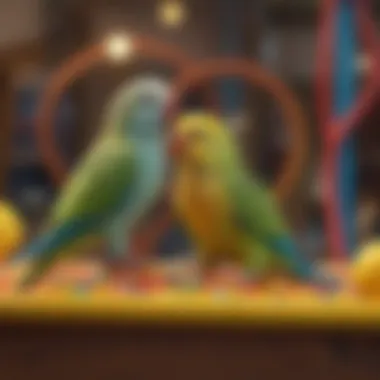
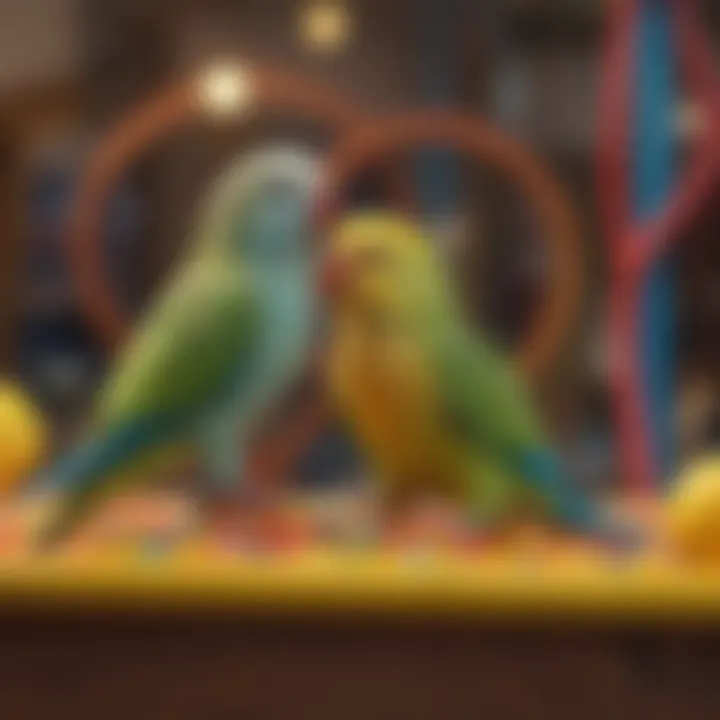
Intro
Entering the world of fancy pet birds is like being handed a vibrant painting, full of colors and unique characteristics. Unlike traditional pets, these birds bring a melody to one’s home, each species singing its own tune while showcasing captivating behaviors. As more people discover the joy of avian companionship, understanding how to provide the best care for these feathered friends becomes paramount.
This guide offers a roadmap for pet bird owners and aspiring bird parents alike, simplifying what could be a complex journey into one of understanding, connection, and responsibility. By delving into various aspects such as care routines, behavioral insights, nutrition, health, and enrichment activities, readers can cultivate a deeper bond with their avian companions and ensure a healthy life for them.
Let’s embark on this journey to elevate avian companionship, transforming a simple pet ownership experience into a thriving partnership that blooms with joy and vitality.
Care Tips
Caring for fancy pet birds goes way beyond a weekly cleaning and occasional feeding. It's about creating an environment that mimics their natural habitat while considering their individual needs. Here are some essential considerations for daily routines:
Daily Care Routines
A structured daily care routine will not only help your bird feel secure but also allow you to monitor their health and behavior effectively. Each day, make it a habit to feed your bird at the same time to establish a rhythm. Observing your bird during this time can reveal much about its health; any changes in eating habits are worth noting.
Cage Setup and Maintenance
The cage is your bird's sanctuary. It should be spacious enough for the bird to stretch its wings without bumping into anything. Choose perches of varying widths to promote foot health and provide them with toys to avoid boredom. Regular cleaning is also imperative—remove droppings daily and scrub the cage weekly with bird-safe cleaning products.
Remember: The happier and healthier your bird feels, the better it will interact with you.
Hygiene and Cleaning Practices
Birds can be sensitive to their environment. Establish a cleaning routine that involves changing their bedding frequently and ensuring all toys are appropriate and clean. Keeping their surroundings tidy reduces stress and promotes overall health.
Seasonal Care Adjustments
As the seasons shift, so do your bird's needs. In winter, consider extra insulation and heat sources to keep them warm. Summer months might require ventilation, as birds can easily overheat. Always be attuned to their comfort level regardless of the season.
Behavioral Insights
Understanding bird behavior is just as essential as knowing their care needs. Birds communicate through a variety of signals, and being aware of these can lead to a more harmonious relationship.
Understanding Bird Body Language
A bird's posture and movements can tell you a lot about how it's feeling. An upright stance may show confidence, while feathers fluffed up could indicate distress. Become a keen observer to better respond to their emotions.
Common Behavioral Issues and Solutions
Every bird may face challenges. From excessive squawking to feather plucking, it’s crucial to identify these issues early. Providing consistent social interaction and mental stimulation can significantly reduce these behaviors.
Positive Reinforcement Techniques
Using positive reinforcement, like treats, can encourage good behavior. For example, if your bird mimics a sound, reward it! This not only strengthens your bond but also enriches their learning experience.
Social Interaction Needs
Birds are social creatures. While some might enjoy solitary time, others thrive on companionship—whether from humans or other birds. Make it a point to spend quality time with them daily, as this will greatly enhance their mental health.
Nutrition Guides
Every skilled bird owner should prioritize proper nutrition, as it plays a significant role in the health of their feathered companions.
Essential Diet Components
While seeds are popular, a balanced diet should include fruits, vegetables, and high-quality pellets. Each species has unique dietary needs, so it’s important to do your research and avoid falling into the seed-only trap.
Safe and Toxic Foods
Being informed about what foods are safe or toxic is vital. For example, avocados and chocolate pose serious risks to birds. Create a checklist of safe foods to keep your avian pal happy and healthy.
Supplements and Treats
Birds can sometimes benefit from supplements, especially if they are in captivity. Calcium and vitamin D can be particularly important for birds that don’t get natural sunlight. Treats like almonds or a small amount of cooked quinoa can also add variety to their diet.
Feeding Strategies for Different Species
From budgies to cockatoos, feeding strategies will vary across species. For instance, larger birds may require more substantial meals than smaller ones. Tailor their feeding based on size, dietary needs, and activity level.
Wellness and Health
Health should always be a priority for pet birds, as they can hide ailments very well. Regular checkups and an eye for any unusual behaviors can make all the difference in your bird’s life.
Routine Health Checkups
Bringing your bird to an avian vet for regular checkups is critical. A trained veterinarian can help catch issues before they become serious. Make it a routine part of their life, similar to how one would approach a pet’s yearly checkup.
Identifying Symptoms of Illness
Watchful owners can catch early signs of illness, which include changes in eating habits, lethargy, or unusual feather loss. Familiarize yourself with the signs so you can act quickly if something seems off.
Preventative Care and Vaccinations
Vaccinations can protect against several avian diseases. Stay informed about what vaccinations your bird might need; reach out to your vet for guidance.
Mental and Emotional Well-being
Birds can experience stress—just like humans. Providing them with a varied environment and social interaction can help ease anxiety and promote emotional health. Pay attention to signs of stress and adjust their environment accordingly.
Enriching Activities
Keeping your bird mentally stimulated is just as important as their physical well-being. Boredom can lead to destructive behaviors, so let's explore some enriching activities.
Toys and Playtime Ideas
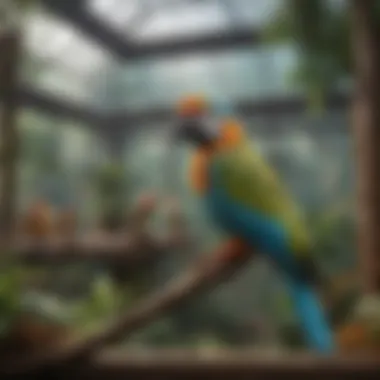
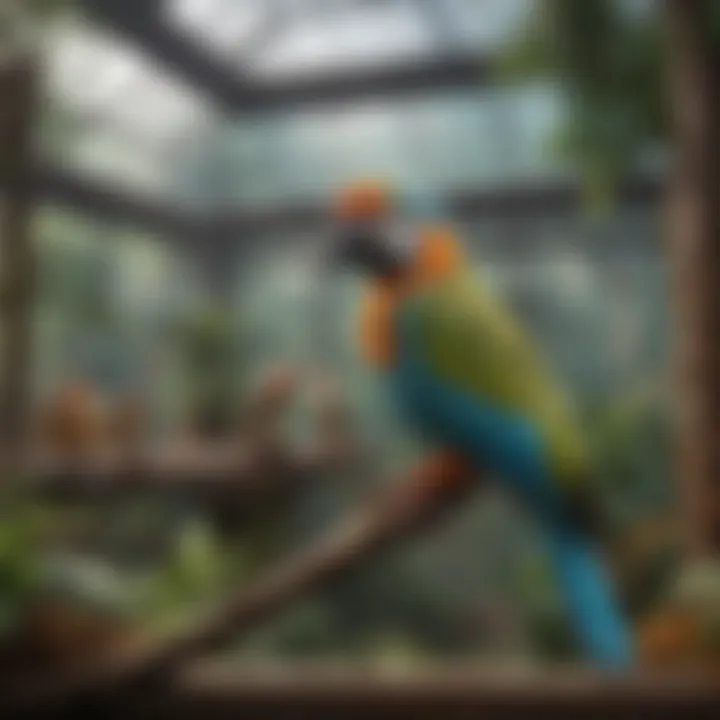
Birds love to play! Invest in a range of toys that encourage problem-solving and creativity. Rotate toys regularly to keep things fresh and exciting.
Training and Tricks
Training your bird is not just about discipline; it's a fun bonding experience. Teaching them simple tricks can stimulate their mind while reinforcing your connection. Start with small feats and gradually build up to more complex tricks.
Outdoor Activities and Interaction
When weather permits, consider letting your bird experience the great outdoors. Supervised flights or time in a secure aviary can provide them the kind of stimulation that’s hard to replicate indoors.
DIY Projects for Mental Stimulation
Creating DIY toys or puzzles can keep your bird engaged. Try crafting foraging toys using materials like paper rolls or cardboard boxes. These projects not only provide fun but also encourage natural foraging behavior.
By considering all these aspects and tailoring your approach to the specific needs of your fancy pet bird, you’re sure to foster an enriching environment. With time, patience, and a dash of love, both you and your feathered friend can enjoy a joyful and fulfilling companionship.
Foreword to Fancy Pet Birds
When considering the companionship of fancy pet birds, it's not just about the aesthetic appeal or the joy of having feathered friends around. This fascinating journey into avian companionship is layered with rich interactions and learning experiences. Understanding the nuances of fancy birds enhances the bond between owner and pet, and sheds light on the myriad of responsibilities that come with their care.
Delving into the world of fancy pet birds brings forth important elements that can significantly benefit both the bird and the owner. These companions require specific habitats, diets, and socialization practices tailored to their unique characteristics. Thus, becoming knowledgeable about the different species, their behaviors, and needs is not only beneficial but essential for fostering a loving environment where both parties can thrive.
Moreover, connecting with others who share an appreciation for these creatures can enrich the experience even further. Whether discussing ideal environments or even best practices for care, the community surrounding fancy bird ownership offers a wealth of insights and support.
Ultimately, this exploration aims to celebrate the intricate lives of pet birds and highlight considerations that elevate the experience of avian companionship.
Defining Fancy Pet Birds
Fancy pet birds are not just ordinary pets; they come with distinct personalities, vibrant colors, and often, melodious songs. These birds are typically bred for specific traits, which enhance their appeal as companions. Fancy birds range from small canaries to larger species like parrots, each characterized by their unique behaviors and temperaments. The term ‘fancy’ usually refers to breeds that have been cultivated for particular attributes, making them highly desirable in the pet market.
Having a fancy pet bird means considering everything from their housing and diet to socialization and play activities. Understanding what qualifies as a fancy pet bird is essential for potential owners who wish to engage in enriching their lives. This knowledge sets the foundation for a fulfilling relationship between pet and owner.
Popular Species Overview
Owners of pet birds often find themselves drawn to several popular species, each offering its own charm and challenges. This section will delve into some of the most common varieties you might consider.
Canaries
Canaries are well-loved for their singing abilities and vibrant plumage. They fill a room with sweet melodies, bringing a sense of joy to any home. Key traits of canaries include their relatively small size and low maintenance needs, making them an excellent choice for both new and experienced bird owners. They thrive in a spacious cage equipped with perches and toys but prefer not to be overly handled, keeping them a bit more independent.
The unique feature of canaries lies in their stunning color variations, which can range from bright yellows to deep reds. This variety allows owners to choose a bird that complements their personal aesthetic. However, the downside is their sensitivity to drafts and changes in temperature, requiring a stable environment for their wellbeing.
Finches
Finches are a lively and social choice among fancy pet birds. With their playful nature, they thrive in groups, making them perfect for those who want a communal atmosphere. Their agile flying and social interactions can be captivating to observe.
The notable characteristic of finches is their cheerful chirping, which fills the air with sound and creates an inviting ambiance in your home. They require less human handling, which can be an advantage for busy people. Still, this means they may not build as close a bond with their owners as some other pet birds. Their relatively low price point can make them appealing for beginners, but they do require a spacious aviary setting to allow for those energetic bursts of flight.
Lovebirds
Lovebirds are renowned for their affectionate nature, often forming strong bonds with their owners or fellow birds. As their name implies, they thrive on companionship, making them perfect for those willing to invest time in socialization. They are small but pack a big personality and thrive on interaction.
What sets lovebirds apart is their playful demeanor and their vivid colors; they can be a true delight to have around. However, potential owners should know they can become territorial if not properly socialized. This necessitates an understanding of their needs, which can be both rewarding and challenging.
Parrots
Parrots are perhaps the most charismatic among pet birds due to their high intelligence and ability to mimic human speech. They come in various sizes and colors, each with unique traits. Many owners appreciate the interactive nature of parrots, making them central members of the household.
A significant feature of parrots is their need for mental stimulation, requiring owners to engage with them regularly through training and play. This dedication can lead to deep, meaningful connections. However, they are also quite demanding in terms of time and attention, which might overwhelm prospective owners. Plus, their lifespan—often spanning decades—means that ownership is a long-term commitment requiring careful consideration of lifestyle and resources.
Understanding Bird Behavior
Understanding the behavior of fancy pet birds is crucial for anyone seeking to build a strong, healthy bond with their avian companions. Each bird species comes with its unique quirks, and familiarizing yourself with these behaviors can significantly enhance your pet bird's quality of life. Not only does it help in identifying what makes your bird tick, but it also leads to better communication and interaction, enriching both their lives and yours. It’s like having a window into their world, where every tweet and flutter has a story to tell.
Communication Patterns
Birds possess a diverse array of communication methods that go well beyond simple chirping. Each sound they make can signify different emotions or needs. For example, a canary's song might reflect joy, while a sudden squawking from a lovebird may signal distress or annoyance. Here are some things to consider regarding your bird’s communication:
- Vocalizations: Observe the various sounds your bird makes. Are they whistle-like, chattering, or loud squawks? Recognizing these sounds and their meanings can help you gauge your bird’s mood or needs.
- Body Language: A bird's posture can be quite telling. Fluffed feathers might indicate relaxation, while a bird that flares its wings might feel threatened or aggressive. Learning to interpret these postures is key.
- Social Interaction: Birds often communicate in social settings. Pay attention to how your bird interacts with you and other pets or people. This interaction is essential for their social development and mental health.
"Birds might not speak like us, but their language is rich and varied; understanding it is the key to a happy companionship."
Social Dynamics
Birds are inherently social creatures and their interactions play a vital role in their well-being. Whether you have one bird or a whole flock, understanding their social hierarchies and relationships can be enlightening. Some aspects to reflect on include:
- Flock Mentality: In the wild, birds often thrive in flocks, creating a complex social structure. If you're keeping multiple birds, pay attention to the pecking order and how they interact with each other.
- Solo vs. Group Living: Individual birds might require more attention if kept alone, as they rely on their human companions for social interaction. Engaging them regularly can prevent loneliness.
- Bonding with Humans: Your bird may also display preferences for certain human family members. Building that connection often requires time and patience, but it’s worth it. Shared activities, like playing or training, can strengthen your bond.
Behavioral Enrichment
Providing behavioral enrichment is vital for your bird's mental and physical health. Boredom can lead to destructive behaviors, whereas stimulation can foster a happy, engaged bird. Here are effective methods to achieve this:
- Toys and Activities: Rotate toys regularly to keep their environment fresh. Birds enjoy toys that they can chew, climb on, or pick apart. Look for varied materials to keep their interest.
- Interactive Play: Spend time each day engaging your bird in playtime. This can include simple games or teaching tricks. Such interaction not only reinforces bonds but also provides necessary mental stimulation.
- Environmental Enrichment: Rearranging their living space occasionally can offer new challenges and experiences, satisfying their natural curiosity.
By paying close attention to these behavioral aspects, you not only foster a thriving environment for your pet birds but also ensure a fulfilling experience for both you and your feathered friends.
Creating an Ideal Living Environment
Creating an ideal living environment for fancy pet birds is crucial for their health, happiness, and overall well-being. Like humans, birds thrive best in a space that is safe, comfortable, and stimulating. Without the right setting, even the most affectionate bird may exhibit stress or undesirable behaviors. A well-planned environment can lead not only to a more fulfilling life for your bird but also enhance the bond you share with your avian companion.
Cage Specifications and Arrangements
The first step in crafting an ideal habitat involves selecting the right cage. Size matters. A larger cage is generally better, providing enough room for your bird to spread its wings and engage in natural behaviors. At minimum, the cage should be as wide as the bird's wingspan and tall enough for it to perch comfortably. For instance, if you're caring for a cockatiel, a cage of at least 24 by 24 by 36 inches will create a cozy yet spacious atmosphere.
When arranging the inside of the cage, think about the layout. Birds love to climb, and establishing multiple perches at varying heights can promote activity. Consider using natural wood perches, as they mimic trees in their natural habitat and aid in keeping their feet healthy.
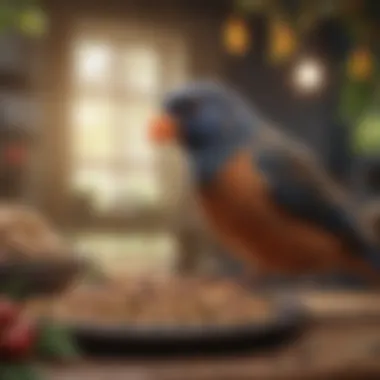
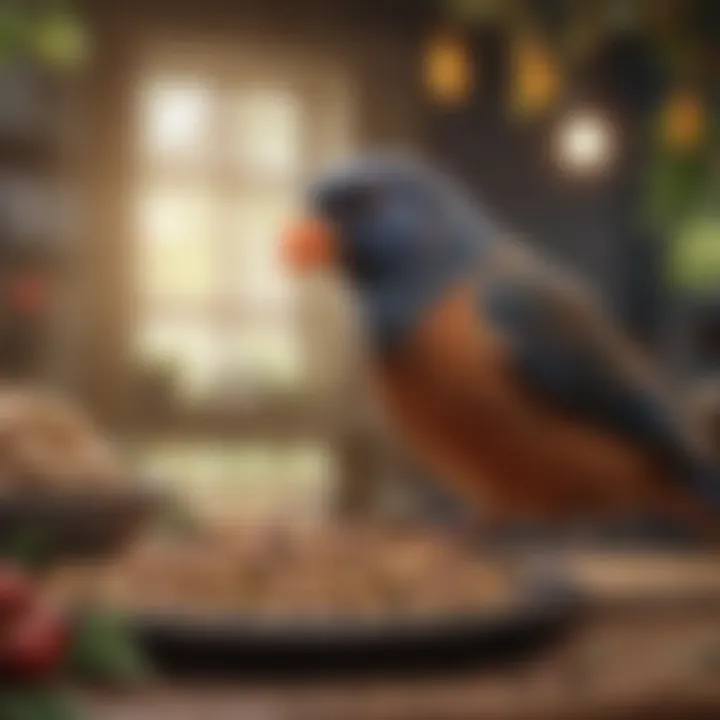
Key arrangements to consider:
- Perch placement: Aim for at least three perches.
- Food and water access: Place bowls at a height where birds can eat and drink easily but cannot knock them over.
- Ventilation and light: Ensure that cages are not located in drafty spots but still receive indirect sunlight.
- Cleaning ease: Choose a cage with a removable tray to make cleaning a breeze.
Essential Accessories and Toys
Accessories and toys play an essential role in keeping your fancy bird entertained and mentally stimulated. A lack of enrichment can lead to boredom and, consequently, undesirable behaviors such as feather-picking or excessive screeching. Investing in a variety of toys can enrich their environment significantly.
Birds enjoy toys that engage their natural instincts to chew, forage, and explore. Here are some popular types of toys:
- Chewable toys: Natural wood, wicker, or cardboard pieces hold interest and satisfy their urge to chew and gnaw.
- Foraging toys: These toys encourage birds to search for treats tucked away inside, mirroring their instinct to seek out food in the wild.
- Interactive toys: Toys that move or make sounds can stimulate their curiosity and keep them active.
In addition to toys, consider providing perches, swings, and even small ladders. These items promote physical health and provide avenues for exercise, which is vital for their well-being.
Overall, when setting up your bird's living environment, think about quality over quantity. It's better to have a few well-chosen toys and perches that stimulate their minds and encourage activity than an overcrowded space that creates confusion and stress.
"A well-thought-out living space not only keeps your bird active but also forms a strong bond with its human companion, nurturing trust and affection."
Ultimately, creating an ideal living environment for fancy pet birds involves thoughtful planning. By focusing on cage specifications and incorporating accessories and toys that resonate with your birds' natural habits, you can cultivate a happy and healthy sanctuary for your feathered friends.
Nutritional Needs of Fancy Birds
Understanding the nutritional needs of fancy pet birds is essential for their longevity and overall health. Just as we need a balanced diet to flourish, our feathered friends do too. The right nutrients can enhance their plumage, energy, and even mood. This section delves into the fundamental aspects of bird nutrition, discussing dietary requirements and special considerations one must keep in mind while caring for these beautiful companions.
Basic Dietary Requirements
Birds, like all living beings, have specific dietary needs that fluctuate with their species, age, and health status. The core of a fancy bird’s diet typically includes seeds, legumes, nuts, fruits, and vegetables.
- Seeds: While they may seem like the obvious choice for a pet bird’s diet, not all seeds are created equal. Some seeds are high in fatty content, which can lead to obesity if fed in excess. Striking a balance is crucial.
- Pellets: Many owners opt for commercially available pellets, which can offer a well-rounded nutritional profile. These pellets often contain vitamins and minerals that seeds may lack.
Other basic food components include:
- Fresh fruits and veggies: These should be served in moderation to provide essential vitamins. Fruits like apples and berries can be excellent for them, while dark leafy greens such as kale add calcium.
- Protein sources: Things like boiled eggs and quinoa can introduce necessary protein for muscle growth and feather health.
A well-rounded diet not only supports physical health but can also stave off behavioral issues linked to boredom or malnutrition.
Special Dietary Considerations
Diving deeper into the nuances of bird nutrition, special dietary considerations must be discussed. These factors can make a world of difference in achieving optimal health for the birds.
Nutritional Supplements
Nutritional supplements serve as an additional layer of care for fancy birds. They are not always necessary for every bird, but they can be beneficial, especially during times of stress or illness. Many pet owners find benefit in adding vitamins or minerals to their birds’ diets to prevent deficiencies.
When considering supplements:
- Wet vs. dry supplements: Wet supplements may be more easily absorbed but can require refrigeration, while dry powders can be conveniently mixed into food.
- Ingredient awareness: It’s important to choose non-toxic and species-appropriate supplements. Not all human vitamins are safe for birds.
The unique feature about nutritional supplements is their ability to address specific deficiencies and support immune health. However, over-supplementing can lead to toxicity, which is a risk that caretakers need to be aware of for their avian companions.
Seasonal Diet Variations
Bird diets should adapt according to the seasons. Just like us, birds may crave different nutrients in winter compared to summer. Seasonal diets can help mimic their natural environment and ensure a more balanced intake of nutrients.
During warmer months, fruit and fresh greens become plentiful. Providing seasonal offerings can boost hydration and nutrients:
- Summer: Introduce juicy fruits like watermelon or cucumber to keep them hydrated.
- Winter: Focus on hearty vegetables like carrots and cooked grains, which provide warmth and energy.
The benefit of adjusting diets seasonally is that it respects their instincts and promotes natural foraging behaviors. However, feeding seasonal offerings can sometimes be a disadvantage if the availability of fresh produce is limited in certain areas.
"Caring for a pet bird means anticipating its needs and understanding the intricacies of their diet. Just like humans, they thrive on variety and balance in their meals."
Health and Welfare of Pet Birds
Understanding the health and welfare of pet birds is no small matter. These delightful companions have individual needs that must be met for them to thrive. Their well-being directly impacts not just their longevity but also their quality of life. A happy bird is a engaging one, full of life and personality. Recognizing and addressing their health concerns early can mean the difference between a chirpy friend and one who’s struggling.
Common Health Issues
Birds, like all pets, are susceptible to a range of health issues. Some common ailments to look out for include:
- Respiratory Problems: Birds have delicate respiratory systems. Symptoms can range from sneezing to more severe issues like wheezing or gasping. A dusty environment can exacerbate these ailments.
- Feather Plucking: This behavioral issue can be rooted in stress, boredom, or health problems. It's more than just an aesthetic concern—it can lead to skin infections.
- Obesity: An overlooked issue in pet birds. Birds who lack exercise or consume too many high-fat foods can become overweight, risking heart disease and other complications.
- Psittacosis: This bacterial infection affects many parrots and can be transmitted to humans. Symptoms include lethargy and respiratory distress.
"Regular vet check-ups can often catch health issues before they become serious."
Staying observant to these issues helps in taking proactive measures to ensure your feathery friend remains in top shape.
Preventive Care Measures
Preventing health problems is far better than trying to cure them. Here are some measures that every bird owner should consider:
- Routine Vet Visits: Finding a vet who specializes in avian medicine is essential. Regular check-ups allow for vaccinations and early problem detection.
- Healthy Diet: Feeding your bird a balanced diet is crucial. Fresh fruits and vegetables should complement their seed-based diets to provide essential nutrients.
- Mental Stimulation: A bored bird can develop unhealthy behaviors. Providing toys and engaging activities fosters their mental health and keeps them active.
- Clean Environment: Maintaining a clean cage and living area reduces the risk of bacterial infections and other health concerns.
Signs of Illness
Knowing your bird's normal behavior is key to spotting illness. Here are some signs that something might be off:
- Changes in Appetite: Eating less or refusing food can be a red flag.
- Altered Droppings: Changes in color or consistency can indicate a diet issue or illness.
- Lethargy: Less interaction, reduced activity, or fluffed feathers can signal a sick bird.
- Excessive Vocalization: Increased squawking or unusual noises often correlate with stress or discomfort.
By familiarizing yourself with these signs, you give your feathered friend the best shot at living a long, healthy life. Remember, your attentive care is the backbone of their health and happiness. Stay proactive and observant; your efforts will pay off in the form of companionship with a vibrant, healthy bird.
Enriching Activities for Pet Birds
Engaging a fancy pet bird in enriching activities is not just a leisure pursuit—it's a pathway to fostering their well-being. Birds, being highly intelligent creatures, require mental stimulation just as much as physical exercise. A bird that's confined to a cage without proper activities often ends up bored, which can lead to stress and behavioral issues. It's crucial to understand how to elevate their daily lives with engaging tasks that fulfill their needs.
Interactive Play Ideas

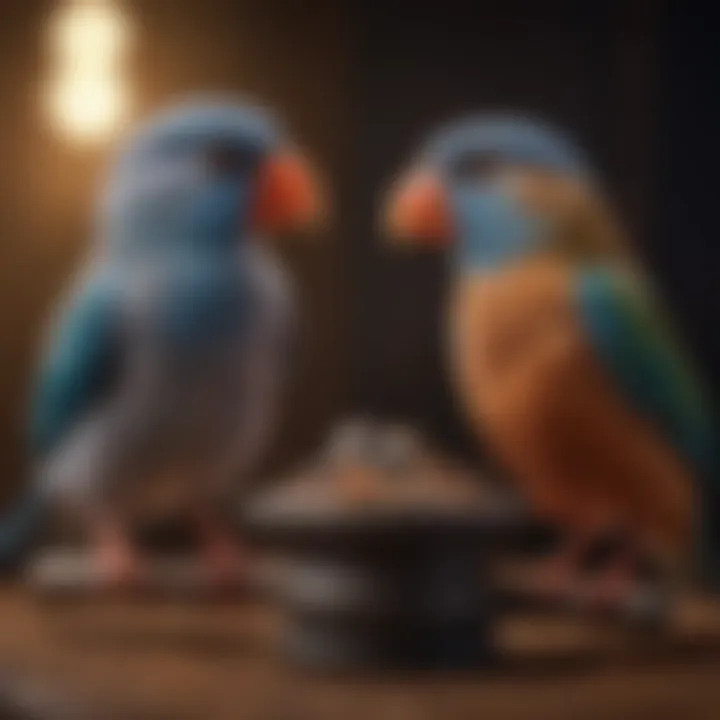
Interactive play is a fantastic way to keep your avian friend intellectually active and physically fit. Consider these fun approaches:
- Foraging Games: Hide treats inside paper towel rolls or small boxes. Birds can work to find their rewards, encouraging their natural instincts to hunt and explore.
- Mirrors and Reflection Play: Many birds find their reflection fascinating. Introducing a safe mirror can entertain them for hours as they interact with what they think is a fellow bird.
- Obstacle Courses: Create a mini obstacle course in your home using ladders, tunnels, and perches. This will challenge them and improve their coordination.
- Rotating Toys: Just like us, birds can get bored with the same old toys. Change and rotate toys regularly to keep things fresh and exciting.
Interactive play is not just about having fun. It improves their cognitive skills, boosts their emotional health, and can even strengthen the bond between you and your pet.
Training and Socialization
Training is an underappreciated part of a bird’s enrichment. Not only does it harness their intelligence but it also brings structure to their lives. Here are some essential aspects:
- Basic Commands: Start teaching simple commands like "step up" or "come here". Use positive reinforcement, like small treats or verbal praise, to encourage desired behavior.
- Socialization: Take your bird out of its cage frequently. Gradually introduce it to new environments, people, or even other pets. This can help them become well-rounded and adaptable.
- Target Training: Using a stick or pointer, train your bird to touch it with their beak. Once they get the hang of it, you can advance to more complex tricks.
- Talking and Vocalization: Encourage your bird to mimic sounds or words. This not only enriches their life but also enhances communication within your household.
A well-socialized bird is likely to be more confident and content in its surroundings. By investing time into training and interactive play, you're investing in your feathered friend's happiness.
A happy bird is a healthy bird—engagement, communication, and fun are key elements for a thriving avian companion.
Understanding Avian Genetics and Breeding
The topic of avian genetics and breeding is like opening a treasure chest filled with knowledge, especially for those who own or aspire to own fancy pet birds. Grasping the basics of how genetics plays into the traits, behaviors, and health of these feathered companions can considerably enhance ownership experiences. Understanding genetics allows bird owners and breeders to make informed decisions, ensuring their birds are not just charming but also healthy and well-suited to their environments. Moreover, a good grasp of breeding practices can lead to the advancement of avian characteristics that align with both aesthetic appeal and temperament.
Basic Genetics of Fancy Birds
Birds, much like humans, come with a distinct blend of characteristics that are determined by their genetic makeup. The colors of the feathers, the shape of the beak, and even behavioral inclinations, all trace back to genetic traits. Let's consider a few fundamental concepts:
- Heritability: This is the extent to which genetic factors influence a trait. For instance, if a bird's parent is a bright, vibrant yellow canary, there’s a good chance its offspring may carry those same bright characteristics due to heredity.
- Genetic Variations: Within any species of fancy birds, variation is inevitable. These variations can lead to different feather patterns, sizes, and even vocal abilities, which enthusiasts greatly appreciate. Taking note of these variations can help guide breeding choices to achieve desired traits.
- Hybridization: Crossing different species can sometimes lead to unique and striking combinations, but it must be approached with caution. Not every mix will yield healthy or viable offspring, and ethical concerns can arise if hybrids are not properly cared for or understood.
Understanding these genetic elements equips bird owners with the knowledge necessary to appreciate the diversity among fancy birds while also allowing them to help ensure the on-going health and vitality of their pets.
Ethical Breeding Practices
When discussing breeding practices, one cannot overstate the significance of ethical considerations in avian breeding. The responsibility lies with breeders not only to produce visually appealing birds but to ensure they are breeding in a manner that prioritizes health and well-being over mere aesthetic appeal or profit. Here are some considerations around ethical breeding:
- Health Screenings: Before breeding, it is prudent for breeders to conduct health screenings to avoid passing on genetic disorders. This step helps in maintaining the overall vitality of future generations.
- Avoiding Inbreeding: Inbreeding may lead to increased genetic disorders along the lineage. Breeders should actively seek to pair birds from different lines to mitigate this risk.
- Breeding Goals: It’s critical that breeders have clear, humane goals in mind. This means not hunting solely for colorful feathers but rather considering the temperament and lifelong health of the birds.
- Responsible Sourcing: Only source birds from reputable breeders who adhere to ethical practices themselves. This cross-check is like vetting a job candidate; while it might take a little extra time, the end result is often much more satisfying.
- Public Awareness: Sharing knowledge around ethical breeding practices encourages more bird lovers to engage in responsible ownership and breeding. Good breeders should be willing to offer guidance and education to new or aspiring owners.
"Ethical breeding is not just about the birds we breed; it is about the legacy we leave behind in the avian community."
Through ethical breeding practices, owners can ensure that the beauty and character of avian species are preserved while also prioritizing the welfare and health of fancy pet birds. A thoughtfully bred bird carries the promise of not just unique traits but a stronger, healthier future.
The Role of Avian Veterinarians
When it comes to caring for fancy pet birds, the role of an avian veterinarian stands as a cornerstone to ensuring the health and happiness of your feathered friend. A qualified avian vet does more than just treat illnesses; they provide a holistic approach to wellness, teaching bird owners about preventative care and lifestyle choices that can enhance their pet's quality of life.
Birds, especially those kept as pets, have specific needs that differ from those of more common pets like cats and dogs. Their delicate physiology and unique behaviors require specialized knowledge. An avian veterinarian's expertise extends to diagnosing and treating conditions particular to birds, performing regular check-ups, and guiding owners on proper nutrition and behavior.
"An ounce of prevention is worth a pound of cure." Having a trusted avian vet is key to catching health issues before they manifest into serious problems.
Choosing a Qualified Avian Vet
Selecting the right avian veterinarian can feel like searching for a needle in a haystack. Not all veterinary practices specialize in avian care, so it’s essential to seek a vet who understands birds inside out. Here are a few pointers to help guide your search:
- Credentials Matter: Look for a veterinarian who has completed specialized training in avian medicine. Membership in organizations like the Association of Avian Veterinarians can be a good sign of dedication to the field.
- Experience Counts: A vet who has experience with a variety of bird species can better address specific health concerns you might face. Don’t hesitate to ask them about their background handling fancy pet birds.
- Reputation Resounds: Online reviews and recommendations from fellow bird owners can point you toward reputable vets. Community suggestions can provide insights into a vet’s demeanor and approach to care.
- Facility Features: When visiting a potential vet, pay attention to the clinic's cleanliness and whether it has specialized equipment for avian medicine.
- Communication Style: A good vet not only treats animals but also communicates effectively with owners. They should be open to answering questions you have, explaining treatment plans clearly, and discussing preventive care options.
Routine Health Checks
Regular health checks are paramount for fancy pet birds. Birds instinctively hide their illnesses; thus, even a bird appearing to be healthy may harbor underlying issues. Routine check-ups can play a crucial role in maintaining your avian companion's vitality.
- Frequency of Visits: Plan for annual check-ups for healthy birds, and more frequently for older birds or those with known health issues. Your vet may suggest a tailored plan based on your bird’s needs.
- What to Expect: During a health check-up, the vet will typically:
- Lab Tests: Depending on their findings, your vet may recommend blood tests, fecal examinations, or diagnostic imaging to establish a full understanding of your bird’s health status.
- Carry out a thorough physical examination.
- Listen to heart and lung sounds.
- Check the beak, feathers, feet, and body condition.
- Discuss diet and behavioral observations to identify possible health indicators.
By collaborating closely with a qualified avian veterinarian, pet owners can proactively ensure that their feathered companions live healthy and enriching lives.
Understanding the Pet Bird Market
The pet bird market is not just about buying and selling birds; it’s a rich tapestry of culture, community, and care that affects both birds and their owners. Understanding this market allows prospective bird parents and enthusiasts to make informed choices, ensuring they're not only acquiring a pet but also contributing to its welfare and survival. As more people recognize the joy of companionship with avian friends, being aware of market trends and sourcing practices has become increasingly essential.
Market Trends in Fancy Birds
In recent years, several trends have emerged that impact the fancy bird market. The growing fascination with unique and rare species has intensified demand, prompting breeders to respond by diversifying their offerings. For instance, the popularity of hand-tamed parrots has soared, with species like African Grey and Macaws topping the charts for their intelligence and sociability.
Another notable trend is the rise of social media platforms where bird enthusiasts connect and share experiences. Platforms like Facebook and Reddit are buzzing spaces where owners share tips, training videos, and showcase their pets, creating a nurturing community. This digital interaction also informs purchasing decisions, often leading buyers to prefer birds that come from reputable breeders who prioritize health and welfare over mere profit.
Some essential factors currently shaping the market include:
- Sustainability Practices: A significant portion of the community is shifting towards eco-conscious breeding methods, valuing sustainable practices that ensure long-term viability for various species.
- Health Awareness: There's a growing consciousness surrounding bird health, leading owners to seek out birds raised in clean, enriched environments.
- Customizable Products: Pet owners are increasingly interested in tailored products and services, such as specialized diets and training programs that cater to their bird's unique needs.
Sourcing Birds Responsibly
Responsible sourcing of pet birds is crucial to ensure their well-being and to endorse ethical practices within the industry. So, how does one go about this? It’s not just a matter of picking the prettiest bird in the store; it's about understanding the background of that bird and the conditions it has been raised in.
- Work with Reputable Breeders: Always opt for breeders who prioritize the health and temperament of their birds. A good breeder will not only provide documentation regarding the bird's lineage but also will be willing to share information about their care practices.
- Adoption Opportunities: Consider adopting from avian rescue organizations. Many birds end up in shelters due to changes in circumstances rather than behavioral issues. Giving a bird a second chance can be profoundly rewarding.
- Be Wary of Pet Shops: While many pet shops offer a range of birds, it is essential to examine their practices. Look for stores that maintain clean environments, offer proper veterinary care, and have knowledgeable staff.
"A bird in the hand is better than two in the bush. But a responsibly-sourced bird in your home? That's a true treasure."
By making informed decisions when sourcing a fancy bird, you not only enrich your own life but also play a part in a more ethical and sustainable pet bird market. The bond you create with your feathered companion will you guessed it, enrich both your lives like no other.
The End
As we draw the curtain on this exploration of fancy pet birds, it’s vital to recognize the multifaceted journey of avian companionship. This article has outlined several layers of understanding, from the unique species of birds that grace our homes to the care protocols essential for their health and happiness. Each segment we've covered reinforces the idea that owning a pet bird is not merely about having a colorful ornament in one's space; it’s about nurturing a living creature that thrives on interaction, respect, and care.
Recap of Key Points
Let's revisit the highlights:
- Defining Fancy Pet Birds: We initiated our journey by clarifying what constitutes a fancy pet bird. Understanding the diverse range of species—from playful lovebirds to charming canaries—sets the stage for appropriate care and understanding.
- Health and Welfare: From common health issues to preventative measures, the well-being of our feathered friends is paramount. Regular veterinary check-ups and familiarity with signs of illness were discussed as critical components of avian health.
- Nutritional Needs: Just like humans, these birds thrive on a balanced diet, necessitating specific nutritional considerations tailored to different species.
- Behavioral Insights: Knowledge about bird behavior can significantly change the way we interact with our pets. Recognizing communication patterns and social behaviors allows owners to develop a fulfilling relationship with their birds.
- Enriching Activities: Practical ideas for interactive play and training were outlined, emphasizing the importance of engagement to prevent boredom and encourage bonding.
- Ethical Considerations: We explored the responsibility that comes with breeding and purchasing practices, urging future owners to source their pets responsibly to avoid supporting negative practices in the industry.
Final Thoughts on Ownership
Becoming a pet bird owner is indeed a commitment, rich with rewards but also challenges. As highlighted, birds are not just pets; they are companions with their own personalities, quirks, and preferences. Each interaction with your avian friend can deepen your appreciation for their unique nature.
Remember, successful ownership requires more than just meeting basic needs. It’s about creating an enriching environment, understanding their behavioral cues, and prioritizing health. By doing so, you�’ll not only foster a fulfilling friendship but also contribute to the overall welfare of your feathered companions.
Ultimately, the journey of owning fancy pet birds is about mutual growth and understanding. As we cultivate this relationship, we enhance the tapestry of life that these vibrant creatures bring into our homes.















